March 11, 2020, Las Vegas, Nevada
I bumped elbows with my colleague Cliff Dickinson and we laughed. It was the fourth or fifth time someone had bumped elbows with me instead of shaking my hand, although many other attendees of the Las Vegas Conexpo trade show had shaken my hand. “I really don’t give a shit,” one exhibitor said at a crane manufacturing booth in Festival Hall. “If I’m going to get sick, it’s already happened.”
Conexpo, the largest construction trade show in North America, seemed like a pretty good barometer for whether I should worry about my upcoming trip or not. With 130 thousand attendees from all over the world, I figured if they weren’t panicking I shouldn’t either; I should go ahead and take my flight the next day to Casablanca, where I would meet two friends to travel to Bangui in the Central African Republic, followed by the Republic of Congo. At that point, I reasoned, we would be bumping elbows in the jungle with lowland gorillas and forest elephants, rather than with sick people in cities.
March 13, 2020, Casablanca, Morocco
I flew back to Denver the next day and stayed in an airport hotel, and the next morning everything still seemed relatively calm. Trump had announced a quarantine for travelers from Europe, but it didn’t include American citizens, and besides, my flight home through Frankfurt was almost a month away. I could change the routing, I thought. Nonchalantly, I posted on social media that I was looking forward to being quarantined in Europe on the way home and hoped it would be in a nice hotel.
My Air Canada flight changed planes in Montreal, and I stopped for a few glasses of wine in the Air Canada lounge. The Swedish Nordic ski team was there, both men’s and women’s, and they were having a drunken riot.
“I wish I could understand Swedish,” I messaged my friend Karen in Vancouver. “They are laughing hysterically and two of the women just fell on the floor.”
“OMG, take a photo,” Karen responded.
“I would, but given who they are, they might get upset,” I said. And later, “the bar manager just shut them off and warned them they might not be let on their flight if they keep drinking.”
There seemed to be a change in tone when I disembarked in Casablanca six hours later. The airport was quiet. There were yellow cards for each passenger to fill out asking extensive questions about where we were from, where we had been, and whether we had any flu-like symptoms.
My phone hadn’t yet picked up the change in location so I taxied to my hotel in downtown Casablanca, the Movenpick Hotel, in relative ignorance. It was only 10:00 am when I arrived but I told the front desk I was too tired after my red-eye flight to wait until 3:00 pm so I asked for a half-day rate for early check-in. Once in my quiet, comfortable room on the 10th floor, I fell deeply asleep.
I woke at 2:00 and turned on my laptop. The news on CNN was disturbing; schools were shutting down, events being cancelled. The Conexpo organization, which had seemed so unconcerned just twenty-four hours ago, announced it was shutting down a day early. I checked my Whatsapp chat groups and my two travelmates for CAR and Congo, Robyn and Matt, were asking if I had landed yet. They were in Portugal and were due to travel to Casablanca to meet me the next day.
“Just got notified by the national parks,” Matt messaged. “They are shutting down, and there are mandatory 14-day quarantines for all foreigners coming into Central African Republic.”
“Martinis in Mozambique?” I texted back, disappointed but still relatively unconcerned.
An hour later the conversation had completely changed. “Cancel everything,” Matt posted on Facebook. “I’m in Europe now and can tell you the wave of what’s coming is going to be swift and rough. I’m trying to get home… asap.” We began messaging back and forth about the impossibility of getting through to the airlines and of changing flight plans. The platinum desk at United Airlines had a recorded message that said it would call me back in 15 minutes, but an hour later the call hadn’t come. Royal Air Maroq, on which our Bangui flight was scheduled, didn’t answer at all.
Mainstream media articles were talking about empty planes flying the skies and how hard-hit the travel industry was by the virus, which had now been officially classified as a pandemic. I couldn’t understand. How was the airline industry so hard-hit when there were so many people trying to get home and unable to?
Robyn and I began messaging separately. “Do you agree with Matt that we should go right home?” I asked her.
“Not really,” she said. “He’s got different worries than I do. He has a home, and a travel business to worry about. I’m kind of homeless right now and if I’m going to get stuck I don’t really care where I get stuck.”
We started talking about going to Afghanistan. That had been my first choice for a spring trip anyway; it just hadn’t worked out for the dates my potential travelmates were planning. After a few minutes on the internet, however, it seemed like a bad idea. A visa would take a while, if even possible, and healthcare options if I got sick would be questionable.
I went to the rooftop pool bar in my hotel and ordered a bottle of wine.
March 14, 2020, Casablanca
The downside of the rooftop bar in my hotel is that thundering techno music kept me awake until 4:00 am. I slept until 10:00 this morning.
Once I finally got up, I reasoned it was time to start making plans. Robyn and Matt had decided to go to the Azore Islands in Portugal; Matt couldn’t get a flight home for another five days, and that was a relatively safe place to hang out. I had looked at flights from Casablance last night but I couldn’t get there until the day Matt was leaving, and I figured Robyn probably wouldn’t stay long.
I went back to the rooftop, ordered lunch, and started researching trekking trips in the Atlas Mountains. 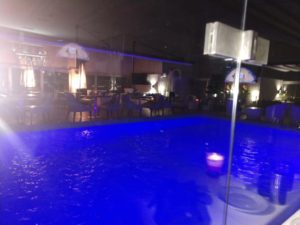 In times of stress, heading for the mountains always seems like the best idea to me. After looking at a few options out of the mountain town of Imlil I decided to start heading that way, with a stopover in Marrakech.
In times of stress, heading for the mountains always seems like the best idea to me. After looking at a few options out of the mountain town of Imlil I decided to start heading that way, with a stopover in Marrakech.
Two American women were at the table next to me and I talked to them for a while. They were distracted, scrolling through their phones, and eventually I realized they were frantically looking for flights.
“As soon as we arrived our tour was cancelled,” one of them told me. “We were advised to go back home, but it doesn’t seem like there are a lot of options for doing that.”
“You don’t think it would be better to wait it out here?” I asked them. “Things seem worse at home.”
My own home in Colorado, Summit County, had recently announced they had the first cases of the virus in our state. As a destination ski resort community, we were bound to get hit early.
“I can’t afford to get stuck here,” the other woman responded. “I have kids, I need to work.”
March 15, 2020, Marrakech
I asked my hotel to arrange a taxi for me this morning. A train would be cheaper, but it had finally started to occur to me that I should avoid being contained with crowds.
The drive took about three hours. My driver didn’t speak English, so I took in the scenery and occasionally scrolled through news on my phone.
Things were starting to shut down all over the US, but especially in Summit County. The governor of Colorado had ordered all ski areas to close, and Vail had already done so – an unprecedented event in my memory. Given that it was spring break season this was creating havoc in the county. On Facebook, people were posting about seasonal workers being out of a job and having nowhere to live. A kind teammate from my volunteer mountain rescue group had suggested that people with empty Airbnbs might open them up to stranded workers.
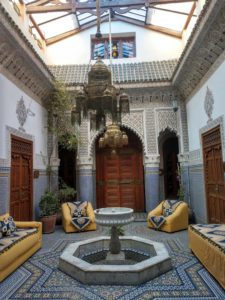 The driver dropped me outside the walls of the medina, or old city, and I walked the narrow alleys to my guesthouse, a riad called the Palais Sebban. It was beautiful, full of open courtyards with flowing
The driver dropped me outside the walls of the medina, or old city, and I walked the narrow alleys to my guesthouse, a riad called the Palais Sebban. It was beautiful, full of open courtyards with flowing  fountains and flowering bushes, and majestic, high-ceilinged rooms decorated with the colorful hand painted tiles Morocco is so famous for. The staff was exuberantly friendly; one of the housemen met me in the lobby and said, “Welcome to your new home! I am Mr. Bean and I will call you Fatima.” I laughed with him and ordered a bottle of wine in the restaurant to be sent to my room.
fountains and flowering bushes, and majestic, high-ceilinged rooms decorated with the colorful hand painted tiles Morocco is so famous for. The staff was exuberantly friendly; one of the housemen met me in the lobby and said, “Welcome to your new home! I am Mr. Bean and I will call you Fatima.” I laughed with him and ordered a bottle of wine in the restaurant to be sent to my room.
March 16, 2020, Marrakech
I opened my laptop immediately upon waking this morning to read the news. And there it was, the announcement I had been hoping not to hear; the prime minister of Morocco had ordered all international flights in and out of the country to be cancelled.
Even though I hadn’t really wanted to go home, the fact that it was no longer an option was unsettling.
I spent a few hours looking online at places to stay in Imlil, finally choosing a charming guesthouse available through Airbnb. Mustapha, the host, messaged that he could send a driver for me the next morning. I began to make plans to stay for a while, a few weeks perhaps; I would hike every day, and write, and maybe dust off my college French. I looked at language learning apps and asked a few friends for recommendations. The more I thought about it, the more it seemed like a good idea to stay in Morocco for a while. This thing couldn’t last more than a few weeks, could it?
I went out to wander the medina in the afternoon. I went to the famous Jama el F’na marketplace, a 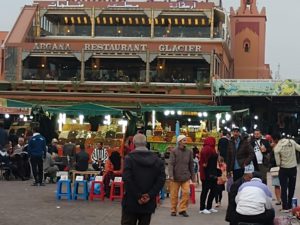 bustling square in the middle of the medina filled with food stalls and snake charmers and musicians. I had read enough to know that the animal cruelty in the square would bother me, and it was true; monkeys chained by the neck and forced by their trainers to perform was more than I could bear.
bustling square in the middle of the medina filled with food stalls and snake charmers and musicians. I had read enough to know that the animal cruelty in the square would bother me, and it was true; monkeys chained by the neck and forced by their trainers to perform was more than I could bear.
Following the recommendation of a travel blogger, I walked through the endless alleys of the souk and let myself become thoroughly lost in the maze, planning to use the GPS on my phone to get back to my riad when I’d had enough. I’d had enough pretty quickly. The touts were overwhelming, and no matter how fast I walked there was always someone shouting “Madame!” and trying to lure me into a stall.
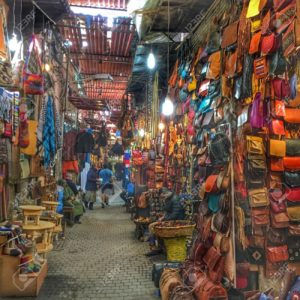 When I pulled out my phone to navigate my way back, it got worse. I had to walk more slowly and sometimes stop altogether, and when I did, the touts would ask me what I was looking for and then try to lead me to their stalls. I became disoriented and frustrated. One man who seemed trustworthy at first said he would guide me back to the Palais Sebban and then he began leading me in the opposite direction. I thanked him and said I no longer needed his help, and he followed me, insisting I was going the wrong way. I finally snapped at him to leave me alone.
When I pulled out my phone to navigate my way back, it got worse. I had to walk more slowly and sometimes stop altogether, and when I did, the touts would ask me what I was looking for and then try to lead me to their stalls. I became disoriented and frustrated. One man who seemed trustworthy at first said he would guide me back to the Palais Sebban and then he began leading me in the opposite direction. I thanked him and said I no longer needed his help, and he followed me, insisting I was going the wrong way. I finally snapped at him to leave me alone.
I arrived back at the riad exhausted and went to the bar. The manager came in, a pleasant Frenchman who had just returned from visiting Belgium.
“I barely got out in time,” he told me. “They are closing all borders in Europe.”
“Do you have many guests staying here now?” I asked him.
“You are the last one. All shops, restaurants and hotels have been ordered to close, so we will close tomorrow after you leave.”
“Will you be able to feed me tonight, or should I try to find somewhere else?”
“I am leaving one waiter here to bring you dinner. He is not the chef, so I pity you.” He laughed.
March 17, 2020, Marrakech
An hour before Mustapha’s driver was to pick me up this morning he messaged me on Whatsapp: “All hotels and guesthouses in Imlil have been ordered to close. I am very sorry but we cannot take you.”
I went to the front desk and asked if I could stay one more night. The clerk nodded and said that a German couple who were also stranded had just checked in, so the riad would stay open at least one more night.
I went back to my room and found an apartment on Airbnb in a mountain town called Ouirgane. The listing said there was a Berber family next door who would cook meals for 150 dirham a day ($15 USD). The owner was a Brit named Peter, and I messaged him first. “A guesthouse in Imlil had to cancel my reservation and now I’m having trouble getting my money back from Airbnb,” I told him. “I just want to make sure that won’t happen again before I book your place.”
“No problem,” he messaged back. “As long as you are not sick, you’re welcome to book.”
I made a reservation for a full week and asked him to send a driver the next day.
I wonder what happens if I get sick.
March 18, 2020, Ouirgane
Rasheed, my driver, turned out to be the brother-in-law of the Berber man who managed the Airbnb for Peter. He spoke passable English and was able to chat with me as we drove up into the mountains. It was a relief to get out of the city, and the drive became more and more scenic as we ascended a road with sharp curves and steep canyon walls on either side. The red rocks and evergreen shrubbery reminded me of the American southwest.
We passed through the village of Asni and Rasheed told me it was the closest village to Ouirgane, where I could find a bank and some real shopping. My Airbnb was another 30 minutes past that.
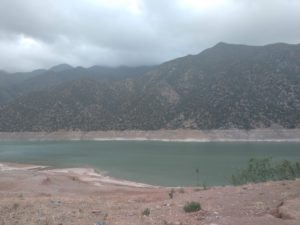 Ouirgane was every bit as beautiful as the blogs and guidebooks had described. Mountains surrounded a large dammed lake, and reddish mud Berber dwellings dotted the hillsides. We passed a gated resort hotel and turned into a driveway just beyond, where Mohamed, the manager, met us at a locked gate. He had a broad smile on his face and welcomed me in broken English.
Ouirgane was every bit as beautiful as the blogs and guidebooks had described. Mountains surrounded a large dammed lake, and reddish mud Berber dwellings dotted the hillsides. We passed a gated resort hotel and turned into a driveway just beyond, where Mohamed, the manager, met us at a locked gate. He had a broad smile on his face and welcomed me in broken English.
“Are you sure you don’t need this, you are OK for cash?” Rasheed asked as I handed him money. I had shared my concern about running out of cash with Peter, who must have passed it on. I was overwhelmed to think this kind stranger was considering my need for cash at a time like this. I assured him I would be OK.
Mohamed led me along a passageway through a shady garden of orange trees and into a door in the stone wall. My apartment consisted of a sunny, open courtyard with closed rooms all the way around: two bedrooms, a living room, a kitchen and a bathroom. There was a roof terrace with stunning views of  the lake and surrounding mountains. Mohamed also showed me further down the passageway to his own home, part of the same gated complex.
the lake and surrounding mountains. Mohamed also showed me further down the passageway to his own home, part of the same gated complex.
“My place, your place, all same,” he said, placing his hand over his heart in a traditional Moroccan gesture of hospitality. He introduced me to his wife, Kadija, and his brother Rachid. Kadija shook my hand warmly before I could back away. People must still be very much in denial here, I thought, hoping I had not been infected in my travels.
Back in my apartment, Mohamed and Rachid set up a cell phone hotspot so I would have wifi, and Rachid told me he offered guide services for trekking. We made plans to do a short trek in neighboring villages the next day, with perhaps a longer trek over the weekend.
They left me to rest and I logged on to see what news I had missed. On the Facebook travel groups I followed, people were discussing how few countries still had open borders. In the States, closures and lock-downs were continuing. The most concerning news for me was financial; some were predicting we were heading for another Great Depression. I had already been dealing with cancellations and refund requests for my two small training companies, and it looked like I would have no income for the foreseeable future. I sent a brutally honest email to two of my three employees, who were currently delivering a class in Maine, to let them know what our cash situation was and asked them to stay safe, get back off the road as soon as possible, and do everything they could to conserve our remaining cash so I could make the next payroll. I made a couple desperate phone calls to customers who owed us money and personal vendors I needed a refund from, hoping my own willingness to give refunds would bring me good karma.
Mohamed and Kadija brought me dinner at 8:00 pm and it was a feast, enough to feed several people. “Too much food!” I protested, but Mohamed just put his hand over his heart and said, “It’s OK, you are very welcome.” I had a fresh salad of tomatoes, cucumbers and mint, bread, and a chicken tagine. Everything was delicious. I fell into bed and slept well for the first time in a week, probably because there is no alcohol available in Ouirgane. This will be good for me, I thought before I drifted off.
March 19, 2020, Ouirgane
This morning I discovered a Facebook group called U.S. Citizens Stuck in Morocco, and it had over 600 members. Many of them had done mainstream media interviews to bring attention to their plight, and they were calling out the embassy in Rabat for doing absolutely nothing to help us. Britain and several European countries were sending chartered evacuation flights to get their citizens home, but the U.S. hadn’t followed suit. There was a video from the American ambassador to Morocco in which he expressed concern but said absolutely nothing of substance. Trump had done newscasts in which he accused Americans stuck abroad of ignoring travel warnings and getting themselves into a predicament as a result. I supposed his accusation was pretty fair in my case; I could have tried to go home right away after the CAR trip was cancelled. But for many others, they had traveled long before any travel warnings came out, and flights had cancelled without any advance notice. They had become stranded through no fault of their own.
Some Americans were camping out at the airport and managing to get flights on the British evacuation charters, but I couldn’t see a reason to give up the very good situation I had in order to sit in chaos at the airport and then maybe get stuck or quarantined in Britain or Europe. It seemed like the media pressure was likely to eventually force the U.S. to do the same for us, and then I could decide whether to go home or not.
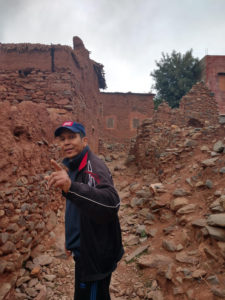 At 10:00 am Rachid came to take me for a short trek. We followed dirt tracks up into hillside villages for about two hours, through village gardens and old, crumbling Berber mud villages. Rachid showed me olive, plum, almond and pomegranate trees. There were beautiful views of the lake from above, and friendly villagers greeted us as we passed by. Rachid described many other treks we could do this weekend with more time; treks to high mountain villages where Berber families would serve us lunch. But I noticed that a few of the village women we passed covered their faces when they saw me, and I wondered if this might be a bad idea.
At 10:00 am Rachid came to take me for a short trek. We followed dirt tracks up into hillside villages for about two hours, through village gardens and old, crumbling Berber mud villages. Rachid showed me olive, plum, almond and pomegranate trees. There were beautiful views of the lake from above, and friendly villagers greeted us as we passed by. Rachid described many other treks we could do this weekend with more time; treks to high mountain villages where Berber families would serve us lunch. But I noticed that a few of the village women we passed covered their faces when they saw me, and I wondered if this might be a bad idea. 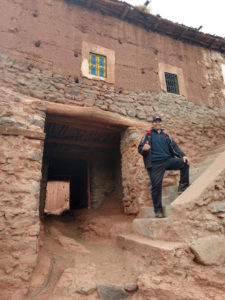
I went back to my apartment and spent the rest of the day monitoring Facebook posts from the stranded Americans group and watching newscasts on my laptop. The U.S. State Department had announced that all Americans should either come home immediately or prepare to be overseas for the long haul. My friend and colleague Jon, whom I’d emailed for advice, said that in his opinion I shouldn’t plan to stay in Morocco unless I had the funds to make it through six months.
It was time for some serious soul searching. Many travelers in my Facebook groups were debating the question whether to stay or go home. They were talking mostly about what was important to them – being with family? Staying healthy? Being free, or being in an environment of their choice?
I asked myself those same questions. I didn’t have children, a significant other or even a pet. I had a mother still living and two brothers, and of course they were important to me, but I rarely saw them anyway. What had always been most important to me was my friends, and my ability to go where I wanted and do as I pleased. It was clear that I was losing my freedom, at least for a while, no matter what I did. As for my friends, I considered the state of lockdown my home community was in. If I went home I probably couldn’t do much more than talk to them on the phone and over social media, and I could do that from here.
If the things that were important to me couldn’t guide the decision, the next question was, what was I afraid of? I wasn’t afraid of the virus, although I did have high blood pressure. But the virus was unlikely to kill me. I also wasn’t afraid of being socially isolated in Morocco; I was going to be socially isolated if I went home, too. I finally had to admit that what I was most afraid of was running out of money. It wasn’t the inspirational sort of criteria other Americans abroad had used to make their decision, but it was the truth. I could not see staying in Morocco if I couldn’t pay my bills and perhaps couldn’t even feed myself anymore. As kind and hospitable as the Moroccan people were, I would not become a burden to them.
March 20, 2020, Ouirgane
When I woke up and checked email this morning there was a message from the US embassy in Rabat. It had come out at 1:00 am, and I had slept through it. It said evacuation flights had been arranged out of Marrakech, starting at 11:30 am and continuing through the afternoon. The flights were operated by British Airways and would go to London and then to one of the ten screening cities identified in the U.S. The U.S. government had paid for the flights and would charge us $1495 each; we would need to sign promissory notes and could not use a credit card to pay. Interested American citizens should fill out an email questionnaire identifying their preferred destination, and we would be assigned seats on the flights in the order our email responses were received. It said we were not to go to the airport without first receiving confirmation of a seat, as we would not be allowed in.
I checked the Facebook page and people were rioting over the cost of the flights, and the fact that we had so little notice and were told not to go to the airport without a confirmation. Some people were six or seven hours away from Marrakech, and transportation options were limited.
Rachid came to visit and I showed him the email and told him I would need to stay by my computer for the day. I messaged Peter in London and asked him to translate a message to Mohamed, that I would need a taxi to Marrakech on short notice. Mohamed stopped by my apartment shortly after and said, no problem, he would either get Rasheed or take me himself.
It was cold out, and it rained off and on throughout the day, so I huddled in my living room with the heater on and the courtyard doors shut, venturing out only when I needed to cross the courtyard to the bathroom or to the kitchen for a cup of tea. As lovely as the apartment was, having to go outside to get to another room was uncomfortable in bad weather.
I spent the entire day on Facebook, Whatsapp or email, communicating with friends and family and reading virus-related news. Many Americans in the “trapped in Morocco” group posted about their experiences as they went to the airport and caught evacuation flights. Some said the process was easy and well organized, others continued to complain. A few people posted photos of empty flights departing and suggested those of us who hadn’t gotten email confirmations yet should ignore instructions and just go the airport, since there were so many empty seats. I was an hour and a half from the airport, and by the time I saw those messages I figured it was too late.
My friend Pam called and told me our mutual friend Claudia in DC had heard through the grapevine that the US was likely to invoke martial law and shut down all travel in the next few days. She said she thought I should do everything possible to get out before it was too late.
“I already came to that conclusion,” I told her, ruefully. “But now it’s a question of whether I will get a seat on one of these flights.” At that point the flights were done for the day, and a message on the embassy website said they were looking at the possibility of a few more flights tomorrow, but there were no guarantees. Moroccan airspace was scheduled to completely close the following day.
“Good luck,” Pam told me as we hung up. “If you can get on a flight to San Francisco you can come stay with me.” Pam’s home was with her husband in Connecticut, but she had been living part-time for years in an Airbnb in Marin County while she worked for a hotel company in the Bay area. Her company was in the process of shutting down many of their hotels, and she was deemed an essential employee as a result. California was on lockdown, but as an essential employee she was still going into work every day. I decided if I could get to San Francisco I would go visit her; the weather there would be much less dreary than in Summit County, and it sounded like she would welcome some company.
At about 2:00 in the afternoon, another email came from the embassy. “We have chartered our final evacuation flights for Saturday, March 21,” it said. “These will be the final flights from Morocco before airspace is closed on Sunday.”
I messaged Rachid, who came by to talk to me again. “Can you ask Mohamed to arrange a taxi for me tomorrow morning?” I asked him. I was not going to wait for an email confirming a seat this time.
“Of course,” Rachid said. “You try to go and we wish you luck. If you can not go, your home is still here with us, you can come back.” He touched his heart and I did the same.
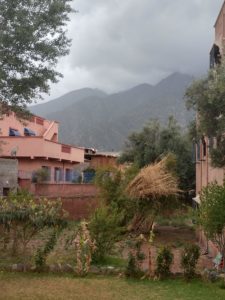 With my plan finally made, and a break in the rain, I went out for a walk. I followed the main road through the village, nodding and greeting every local I passed. They stared at me, surprised to see a foreigner, but they all greeted me warmly. “Salam!” some said, and others, “Bon soir!” I took a dirt road down to the dam and walked along the lake for a while. Steep canyon walls rose from the water to merge with forested mountain slopes on the other side of the lake, and I wished I had time to stay and climb them. I circled around to the main road and headed back to my apartment. There were many guesthouses and restaurants along the way, all of them closed, and I thought about how difficult life was about to become for these villagers, many of whom clearly depended on tourism. I decided I would pay Mohamed for the full week of meals he had been counting on.
With my plan finally made, and a break in the rain, I went out for a walk. I followed the main road through the village, nodding and greeting every local I passed. They stared at me, surprised to see a foreigner, but they all greeted me warmly. “Salam!” some said, and others, “Bon soir!” I took a dirt road down to the dam and walked along the lake for a while. Steep canyon walls rose from the water to merge with forested mountain slopes on the other side of the lake, and I wished I had time to stay and climb them. I circled around to the main road and headed back to my apartment. There were many guesthouses and restaurants along the way, all of them closed, and I thought about how difficult life was about to become for these villagers, many of whom clearly depended on tourism. I decided I would pay Mohamed for the full week of meals he had been counting on.
When I was almost home, a police car stopped on the side of the road and the officer gestured to me. We tried to communicate in a mixture of broken English and French.
“Where you go?” he asked. “You are OK?”
I nodded and tried to show him a photo of my Airbnb. It was only a photo of a narrow alley with a door in it, and he looked confused. I showed him another photo, this one of Rachid, from my trek yesterday. 
“Rachid and Mohamed,” I said, pointing up the road. “OK if I go? Allez?” He waved me on.
Back in my apartment I checked email and found that the embassy had finally assigned me to a flight for the next day. Just in time, I thought. Clearly if I stayed I would be confined indoors, and that would be the final straw.
March 21, 2020, Marrakech Airport
I arrived at the airport at 9:30, a half hour before the embassy email had said to arrive. There was a long line of Americans waiting in front of a British Airway desk, stretched across the entire length of the terminal, but there were no embassy or airline personnel to talk to yet. A woman at the information desk told me to sit and wait for people wearing green vests to show up. I perused the Facebook group while I waited and read posts from what looked like a pretty large group of Americans who had decided to stay. Some were full-time travelers who had no home to go to. Others couldn’t get to Marrakech and were now going to miss the last flights out. Some were planning to get together and rent a house on the beach, and they sounded optimistic. Others sounded desperate, especially a young woman named Cynthia, who was in a wheelchair and had two small dogs that the embassy said were not allowed on the evacuation flights. She had been posting screeching emails in capital letters on every post in the group for days.
A young woman wearing a green vest arrived a little after 10:00 and people rushed to talk to her. She backed up and asked them to give her some space. Then she made an announcement with a handheld microphone and asked us to get in the long line to have our credentials checked. She said there would be three flights, and they would accommodate all of us, so we needn’t worry.
I stood in line and chatted with a few other Americans. A friendly Bostonian named Vinny stood behind me with his Moroccan wife and told me how he had come for his first visit with his in-laws, and had converted to Islam while he was here. He showed me photos of the ceremony in a mosque in Casablanca.
“She never asked me to do it,” he said. “But I decided I wanted to, and I kept it as a surprise for her until we got here.” They had come a few weeks ago and had planned to stay until April, but now they were going back to Boston for fear of being stuck indefinitely.
An American woman standing near us, who looked Moroccan by descent but had a vaguely British accent, began talking loudly about how she believed the whole “virus thing” was a hoax.
“I’m in healthcare and something’s just not right about all this,” she said.
“I don’t think conspiracy theories are helpful right now,” I told her, hoping to shut the conversation down before it really got going. But she was just getting started.
“Where did this thing come from?” she demanded. “They say bats in China. Did you know it’s nearly impossible for humans to catch something from an animal?”
“All it takes is one,” I pointed out.
“Something’s just not right,” she repeated. She was speaking loudly and spittle sprayed from her mouth. I took a step back.
“The whole world is panicking, it’s ridiculous!” she continued. “I was coughing in a shop the other day and someone moved away and asked me to stay away from him. Can you imagine? I’ve never been so offended!”
I turned away and faced forward in the line. I was sorry not to be able to talk to Vinny and his wife anymore, but there was clearly no reasoning with this woman and I needed to get away from her. She was dangerous.
I finally reached the embassy desk and my passport was checked. “Where do you want to go?” a young woman asked me. I had listed Newark, Dulles and San Francisco as options in my email to the embassy, but now I thought I’d better prioritize, since the system didn’t seem to be set up for multiple options.
“San Francisco if possible,” I said. She put a sticker on the back of my passport and waved me to a British Airways desk.
Unlike some of the flights I’d seen photos of yesterday, my flight to Heathrow was packed, every seat taken. Some of the passengers were wearing masks and gloves, but none of the flight attendants were. There seemed to be no precautions taken, and it occurred to me that if I was going to contract the virus, this was where it was going to happen.
I ordered a drink from a friendly flight attendant and asked her if she was worried. “Of course,” she said. “I haven’t been working all week until I got this flight, and I don’t know when the next flight will be.” She didn’t say anything about being worried for her health.
In the Heathrow arrivals terminal we waited in another long line, and I was given a hotel voucher and a flight to LAX for the following day. Los Angeles, it figures, I thought. I didn’t have any close friends in LA, so I’d have to find a flight to Denver right away.
March 23, 2020, Heathrow and Newark Airports
My bed at the Heathrow Renaissance Hotel was luxuriously comfortable compared to the beds I’d had in Morocco, and I’d had every intention of sleeping in this morning. But at 6:00 am I woke with the sudden thought that I should call United and use the credit from my original return flight to go from Heathrow all the way to Denver.
I called United and the hold time was only 20 minutes, an improvement from the last time I’d tried to call. The agent who took my call sounded as if she was cringing when she told me she could give me a business class flight to Newark and then to Denver but would have to charge me the $110 Heathrow airport fee. “That’s great!” I said. “Let me have the flight number so I can try to have a bag transferred from British Airways.”
I dashed downstairs for breakfast and called British Airways on the way. They couldn’t transfer my bag and said I’d need to come get it. I had about three hours to get back to the airport, pick up the bag in one terminal, and get to another terminal to check it back in and clear security. Under normal circumstances, no problem. But nothing was normal now.
I waited outside the baggage office for a half hour before giving up. A baggage clerk helped me fill out a lost bag claim and I headed for the United terminal.
My business class seat was in an enclosed pod with no one next to me — exactly what one wants during a pandemic. I settled in for a pleasant eight-hour flight, and for the first time in days, I didn’t touch my phone or computer. I watched a movie, had lunch, took a nap and decompressed.
As we deplaned, CDC officers wearing masks and gloves lined the walls of the jetway. We were ushered into a line where other CDC personnel were taking temperatures, collecting the health questionnaires we had filled out on the plane, and handing out information packets. My temperature was normal, and I leafed through the packet as I waited in the immigration desk line. It was the same packet they were handing out to travelers from China, and it said I needed to self-quarantine for 14 days and monitor my temperature twice a day. Apparently our overnight at Heathrow had put us all in the high risk travel category.
Newark airport was a completely different picture than Heathrow. Heathrow had been a little quiet, but normal. Newark was nearly shut down. Restaurants and shops were closed, with just the occasional newsstand open. Of the four United clubs, only one was open. I headed straight there and sat four stools away from the only other guest at the bar. I ordered a drink and then noticed the man next to me was the same friendly Brit that had been in the pod in front of me on the plane.
“Hey there, neighbor!” we greeted each other.
“What do you guys want to watch?” a cheerful bartender asked as he brought me a Chardonnay. Star Wars was on the TV monitor above the bar.
“How about news?” I suggested.
“Something neutral, like Fox,” said the Brit, who introduced himself as Rick, an expat living in Miami.
“Neutral, Fox?” I tried not to scoff. We debated for a few minutes, finally settling on the BBC channel. UK’s prime minister, Boris Johnson, was just delivering a reluctant lockdown announcement. We listened for a while, then shared our recent travel experiences.
“I was in Dubai,” Rick said, “doing research for a new book I’m writing.” It was something art-related, but I was half listening, still distracted by the news. “I almost didn’t make it out. Apparently, they’re shutting down all Miami flights soon.”
“Yeah, same here,” I said. “I was on one of the last evacuation flights out of Morocco.”
“The world has changed,” Rick said, echoing the platitude that we travelers had offered to each other over the past few days.
Now that I was finally back in the US, emotion began to wash over me. I held back tears as I said, “I saw a Facebook post recently that stuck with me, something like, ‘when all this is over, all that will matter is how we treated each other.’”
Rick nodded, thoughtfully. “I guess that’s true.” He gathered his things to head out for his flight, and handed me his card as he left, asking me to keep in touch.
I don’t know if it’s true that how we treat each other is only thing that matters. I think when all this is over, it will also matter what we lost, and what we learned. But how we treat each other is the one thing we have control over right now, and I just learned a lesson from the Moroccans on the subject. So that’s what I’m going to focus on.

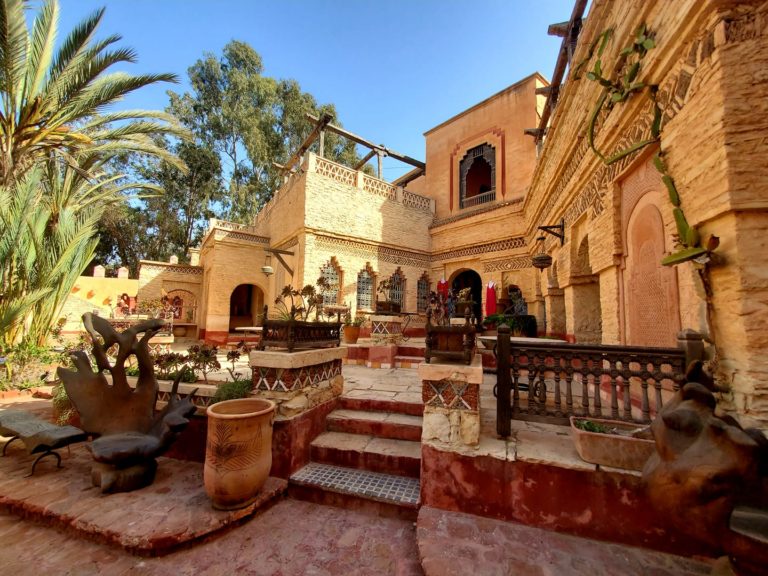
Comments are closed.